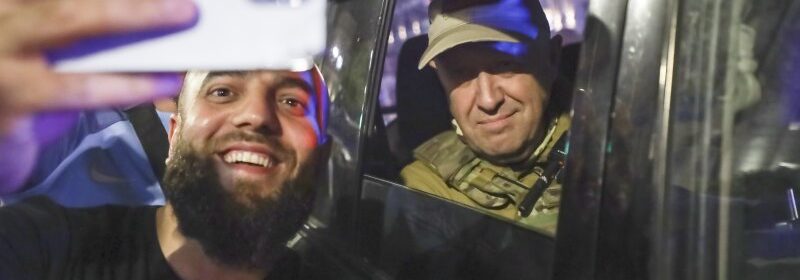Prigozhin denies trying to overthrow Putin as Wagner chief defends Russia insurrection

Save articles for later
Add articles to your saved list and come back to them any time.
The head of the Wagner mercenary group, Yevgeny Prigozhin, has said that he was not trying to overthrow the Russian government by marching on Moscow in comments likely to fuel further speculation about the terms struck to stop the warlord’s attempted coup.
In an 11-minute voice recording released on social media, his first since the armed uprising against Russia’s military leadership on Saturday, Prigozhin said he wanted to demonstrate his objection to a decision to disband Wagner and also to demonstrate Russia’s poor domestic defences.
Yevgeny Prigozhin, the owner of the Wagner Group military company, right, sits inside a military vehicle posing for a selfie photo with a local civilian on a street in Rostov-on-Don on Saturday.Credit: AP
Prigozhin said the march towards Moscow by Wagner troops to within 200 kilometres of the capital on Saturday was a protest aimed at bringing to account those responsible for “enormous mistakes” in Russia’s war in Ukraine, as well as to prevent the “destruction” of his mercenary group.
Prigozhin had not been seen or heard from since he drove away from the southern army headquarters his Wagner militia briefly took over on Saturday and is still facing charges for his armed insurrection despite the Kremlin promising the charges would be dropped, according to state media.
“We didn’t have the goal of toppling the existing regime, which is lawfully elected, as we have said many times,” Prigozhin said, who did not refer to President Vladimir Putin by name.
“Our decision to turn around came from two important factors. The first was that we did not want to spill Russian blood. The second, we were marching to demonstrate our protest, not to unseat the government.”
In a deal struck by Belarusian President Alexander Lukashenko, Prigozhin was offered free passage to Belarus and immunity from charges of inciting rebellion.
But Ria Novosti, Russia’s main state news service, on Monday cited a source in the prosecutor-general’s office saying the charges had not been dropped. Kommersant, a Russian business newspaper, also reported that the FSB, Russia’s main security service, was still investigating Prigozhin and said “not enough time has passed to take another decision”.
Prigozhin said on Telegram that Lukashenko offered to find ways for Wagner to keep working legally.
He said that the trigger for his rebellion was a strike by the Russian army on Wagner’s camp in eastern Ukraine that killed about 30 of his fighters. He insisted, however, that his actions were not a coup attempt.
Prigozhin, formerly a close ally of Putin, said the ability of Wagner troops to progress unimpeded reaching a few hundred miles from Moscow showed serious security problems in the country.
“The goal was to prevent the destruction of the Wagner [private military company] and to hold to account those who, with their unprofessional actions, made a huge amount of mistakes during the special military operation,” he said, using the official Russian terminology for the full-scale invasion of Ukraine.
“It was not our aim to topple the current regime. We covered 780 kilometres in a day. Not a single soldier on the ground was killed. We regret that we were forced to strike at aircraft, but they were dropping bombs on us and launching missile strikes.”
Prigozhin spoke out hours after Defense Minister Sergei Shoigu was shown on state television on Monday at what the Defense Ministry said was the forward command post of Russia’s ‘Zapad’ group of forces in the war zone in Ukraine.
The Wagner founder has heaped abuse on Shoigu for months, accusing him of bungling the invasion of Ukraine and of attempting to “destroy” Wagner.
Putin hasn’t been seen since early Saturday either when he denounced the revolt as “treason” in a TV address to the nation and threatened “harsh” punishment that never transpired.
Prigozhin didn’t disclose his whereabouts since announcing late Saturday that he was calling off the assault and withdrawing his forces.
The rapid chain of events has left the US, Europe and China puzzling over the political fallout from a rebellion that shattered Putin’s invincible image as Russia’s leader and spiralled into the greatest threat to his nearly quarter-century rule.
The crisis highlighted bitter divisions within Russia over the faltering war in Ukraine – the biggest conflict in Europe since World War II – as a Ukrainian counteroffensive continues to try to push Putin’s forces out of occupied territories.
Get a note direct from our foreign correspondents on what’s making headlines around the world. Sign up for the weekly What in the World newsletter here.
Most Viewed in World
From our partners
Source: Read Full Article

